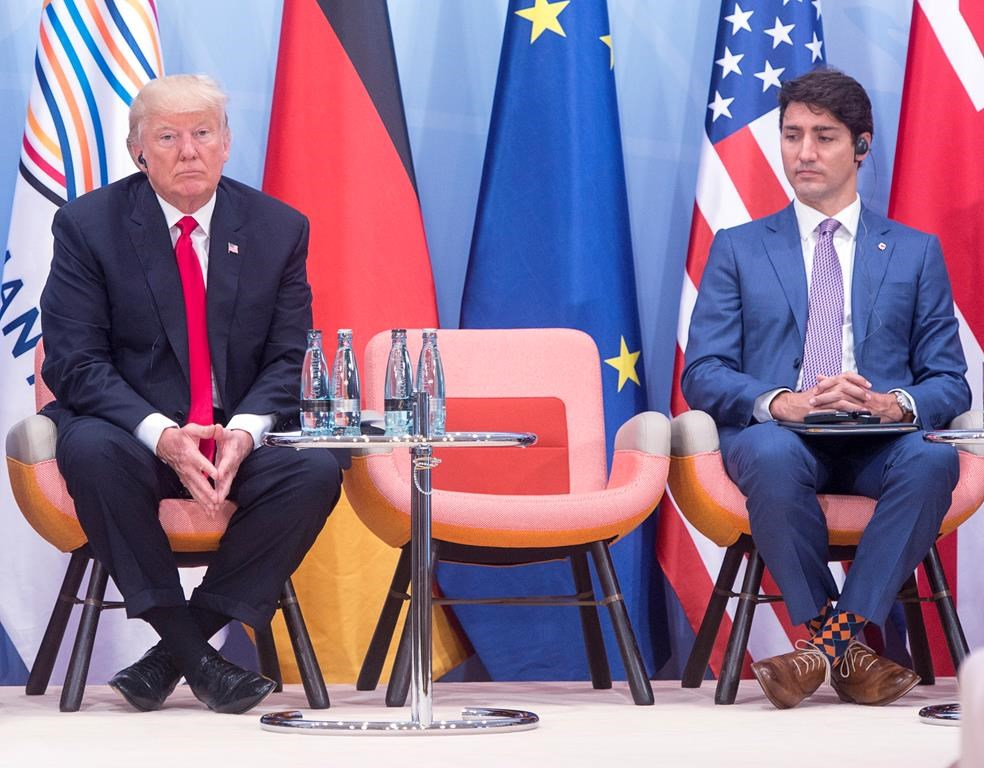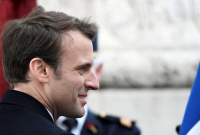Support strong Canadian climate journalism for 2025
A new world order emerged at the G20 world leaders' meeting in Hamburg last week.
Three countries led by progressive-minded leaders – Germany, France and Canada – have assumed the moral leadership of the free world and will now attempt to chart its course.
The G20 represents two-thirds of the world's population and all industrialized major economies. Member countries have about two-thirds of the world's population, produce 80 per cent of its economic output, and account for three-quarters of global trade.
As the United States slips voluntarily behind the curtains, the new invigorated leadership that emerged at G20 will likely ensure that this new world order is not directed by a single superpower (or by bipolar ones).
Will Trump's U.S. isolate itself from a new world order?

Among G20 members, Russia and the United States will continue to flex military muscle around the world's trouble spots. The latter remains an economic might to contend with on the world stage.
Since coming to power, President Donald Trump voluntarily withdrew the United States from a number of agenda items being pursued by fellow world leaders, including tackling the effects of climate change and pursuing free trade agreements.
The unilateralist stand isolates the United States. Syria and Nicaragua are the only other two countries in the world which have not signed the Paris Agreement on climate change. Furthermore, others in the G20 remain enthusiastic about promoting free trade.
French President Emmanuel Macron has already announced plans to convene a summit in December in Paris on climate change. Germany’s Angela Merkel, who chaired the G20 summit, emerged as a responsible and trusted leader to manage world affairs.
Trump’s 20-minute bilateral meeting with his Russian counterpart Vladimir Putin extended to over two hours – a good sign for diplomacy. The two discussed and agreed on a ceasefire plan for Syria.
Other G20 countries will have their own to-do lists
Meanwhile, China will continue to steadily but actively enhance its economic and military capabilities, as it steps up the ladder in its desire to become a world leader.
Japan, India and the U.S. will continue to develop closer relations to contain and challenge Chinese expansionist moves.
Xenophobia-gripped Britain is busy navel gazing following the Brexit referendum’s signal that a majority of those who voted in the United Kingdom wish to exit the European Union's single market of 28 nations with a population of over 500 million.
Britain is trying to sort out many things on various fronts, including how to disengage (and at what cost) from Europe; Scottish independence; immigration; terrorism attacks; and the Conservative Party trying to stay in power after having blown away its majority in an unnecessary recent election.
Australia, Japan, Mexico and South Korea will continue to pay attention to their economies and stay the course, charted by their allies, which thus far has served them well.
India will continue to struggle to impress the world with its economic prowess while facing challenges on the domestic front. It is struggling in its bid to form reliable and trusting alliances with the western world.
And Brazil’s preoccupation with domestic political challenges hamper its ability to make any significant contribution to the evolving world order.
Argentina, Indonesia, Italy, Saudi Arabia, Spain (a permanent guest at the G20), and South Africa will continue to trudge along with nothing new, different or dynamic to offer to help chart a new course. However, Turkey remains a wild card as its President Recep Erdogan shuffles and shuttles between capitals trying to find an ally and a role for his nation.
Saudi Arabia, the only Arab country in the G20, and South Africa, the only African country in the group, are preoccupied with regional and domestic issues, respectively. South Africa is facing massive economic challenges, especially with a slowdown in its mining sector and continuing corruption charges against President Jacob Zuma from within his party. South Africa’s pre-occupation with domestic political shenanigans has rendered it impotent to play any constructive role on the African continent.
Canada will have a special role as broker

Here is where Canada can step in as a trusted, reliable and honest diplomatic broker on the world stage.
The United States may have sidelined itself on a number of major issues at the G20 Summit, but it still remains an economic, military and political giant on the world stage. Who better than Ottawa to be the interlocutor and listening post for many countries of the world – not only because of its physical proximity, but also because of the two countries' intertwined relationship on all matters, including trade, defence and culture.
No one reads the United States better than Canada. Hence Ottawa will be a hub of diplomatic flurry, under the radar of course, seeking and reading signals emanating from its neighbour to the south. Canadian diplomats will become a sought-after and prized commodity for some of the 126 diplomatic missions in Ottawa.
The United States also knows better than to ignore Canada, a valued and trusted neighbour and partner in many international forums. In its dealings with the Trump administration Canada has wisely chosen to navigate diplomatically, rather than take a confrontational approach.
The chemistry between Trudeau and Macron works well and the political tango between the two will likely pick up in step, as they are of the same vintage and similar viewpoints. They will work together with another congenial and like-minded colleague, Germany’s Angela Merkel, to make the world a better place.
Bhupinder S. Liddar is a retired Canadian diplomat and former editor/publisher of Diplomat & International Canada magazine.







Comments
* All well and good in these troubled times, if Trudeau, Macron and Merkel "assume the moral leadership of the free world" and "attempt to chart its course" while Trudeau is seen as a "trusted, reliable and honest diplomatic broker on the world stage" . Ironic isn't it, that as he steps so willingly into these 'hero' roles, he continues to blatantly step away from the role of 'Climate Hero' assumed in the Paris Accord. While committing then (in word) to the goal of less than 2 degrees C rise in global temperature, in 'deed' he has reassured the Fossil Fuel industry that "no country would find 173 billion barrels of oil in the ground and just leave them there.” So he has approved Kinder Morgan, Line 3 and Line 10, all of which open the Tar Sands to massive increases in extraction. All these projects and more were approved by the captured regulator, the NEB which he promised to reform before reviewing any of these projects. The tripling in capacity of the expansion in diameter of the 40 km segment of Line 10 in Hamilton, Ontario alone will create twice the GHGs daily that were saved by Wynne's shut down of 6 coal facilities.
* His ongoing position on Climate Change is one of "have your cake and eat it too". Adapt and mitigate climate change impacts, create new jobs with innovation and technology AND make climate change worse by opening up massive additional infrastructure and continuing generous subsidies to the industry. Not to mention of course, his total disrespect of Indigenous rights. So much for nation-to-nation respectful relationship building and protecting the planet for future generations.(Moral leadership indeed!)